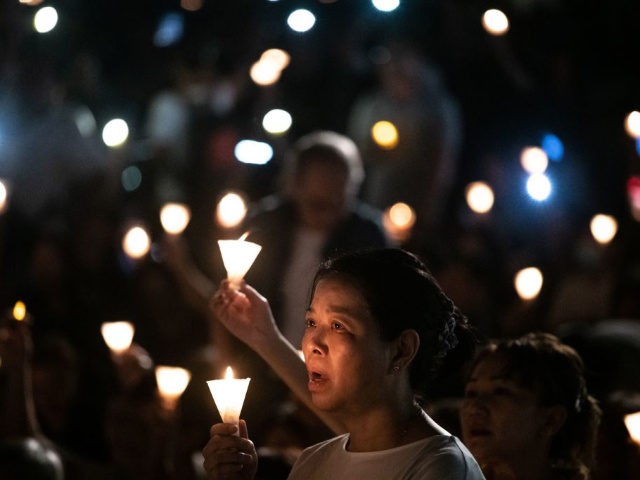The government of Hong Kong announced on Tuesday a 14-day extension of bans on large public gatherings in the city, resulting in the prevention of any mass public events until June 5. June 4 is the anniversary of the Tiananmen Square massacre, an event Hong Kong typically marks with a candlelight vigil.
Last year, the Tiananmen Square vigil attracted tens of thousands of people and preceded the evolution of isolated pro-democracy events into a sustained movement against Chinese colonization of the city. Hong Kong officially became an “autonomous” region of China in 1997, after the United Kingdom handed over sovereignty. The deal, known as “One Country, Two Systems,” was supposed to allow Hong Kong to retain its tradition of Western-style individual rights but, under dictator Xi Jinping, China has been increasingly imposing laws to erode civil rights safeguards.
Protests against China’s impositions, most notably a proposed law that would have allowed Hong Kong to extradite anyone to China accused of violating repressive Communist Party laws, sustained themselves for months before dwindling in light of the Chinese coronavirus pandemic. Hong Kong did not lock down completely like many parts of the world, but did ban mass gatherings for weeks. Those restrictions partially lifted at the beginning of the month in light of a diminishing number of new coronavirus cases, triggering a near-instant return of the protests.
On Tuesday, Hong Kong Secretary for Food and Health Sophia Chan announced that her government needed to extend a ban on public gatherings of more than eight people in light of newly confirmed coronavirus infections believed to have occurred within Hong Kong. At press time, Hong Kong has documented 1,056 cases of Chinese coronavirus and four deaths. The current ban would have elapsed on Thursday.
“As seen from the recent local confirmed cases, the transmission chain in the community has not been completely broken off yet,” she said, citing the three latest confirmed coronavirus cases in the city. Authorities announced on May 14 that a 62-year-old man had joined his wife and granddaughter in testing positive for the virus. The man’s wife tested positive after 23 days of Hong Kong not documenting any new local cases. Doctors typically wait for twice the believed incubation period of a virus to go by without new cases to declare that local community transmission chains have been broken, which in this case would have been 28 days. The new cases resulted in Hong Kong officials planning to test people in 860 households in the family’s neighborhood linked to exposure to those involved.
Chan noted on Tuesday that the fact that the virus may still be infecting people freely within Hong Kong made it impossible to lift gathering restrictions or allow the opening of nightclubs and other inherently crowded businesses, but announced one concession: the restoration of religious gatherings at 50 percent capacity.
Chan denied that the extension of the gathering ban was intended to ensure that it would be illegal to observe the June 4 anniversary of the Tiananmen Square massacre.
“There are no other considerations in terms of the social distancing measures,” she insisted, noting that all extensions of the coronavirus protection measures have been 14 days, so the timing that included June 4 was a coincidence.
Police have used the ban on gatherings in past weeks to arrest peaceful protesters in several shopping centers throughout the region. Hong Kong Chief Executive Carrie Lam is also pushing to criminalize another form of dissent, “disrespect” for the Chinese Communist Party anthem “March of the Volunteers,” as soon as possible. Lam called for lawmakers friendly to her administration to put a law that would result in up to three-year prison sentences for disrespecting the anthem at the top of the docket, making it possible to pass the ban before June 4. Pro-Beijing lawmakers retook the Legislative Council – not without a literal fight from pro-democracy counterparts – this week.
The upcoming anniversary observes the killing of an untold number of people – recent estimates suggest around 10,000 protesters – in Beijing in 1989 for protesting against communism. Inspired by the impending fall of the Soviet Union and protests throughout the states behind the Iron Curtain, Chinese citizens flooded Beijing’s iconic Tiananmen Square for peaceful calls for reform. The Communist Party responded with tanks and ammunition.
Hong Kong has observed the anniversary of the murders every year since, making it the only part of China to organize gatherings for the event when it joined the communist empire in 1997. Macau, China’s other “special administration region,” typically holds a small photo gallery event, but that, too, was canceled this year.
In China, censors work around the clock to erase potential references to the massacre. As last year marked the 30th anniversary, censors not only blocked direct references to Tiananmen Square, but a set of over 260 words that may trigger related results, such as “today,” “candle,” and numbers like 6, 4, 1989, or any combination thereof.
Last year, organizers said that 180,000 people filled Hong Kong’s Victoria Park, carrying candles and other lights to represent the people killed by the Communist Party. Police, which have been consistently accused of undercounting protest crowds in subsequent events, claimed only 40,000 people attended. The event did not prompt any altercations or violence.

COMMENTS
Please let us know if you're having issues with commenting.